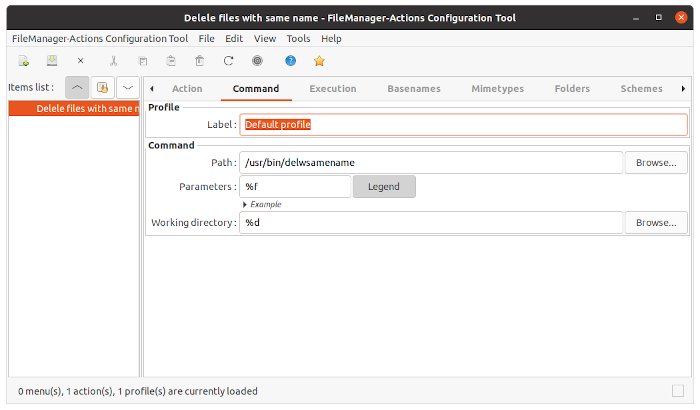Long story short: yesterday, I worked on an old C project and refactor the entire structure.
That project counts hundreds of files and, when deleting the unused .c files, I was thinking about an auto-magical method to delete also the coupled .h file.
I thought the solution was to add a right-click action on Nautilus to enable deleting all files with the same name (but with different extensions).
Then I wrote this post to help people save the “10 minutes googling”!
Disclaimer
I tested this method on my Desktop machine. Hence I cannot guarantee that it works on different setups.
- Desktop environment: GNOME 3.*
- Distro: Ubuntu 20.04
- Filemanager: Nautilus
I have not tested it, but it may also work with Caja and Nemo.
Filemanager actions on GNOME
At first, you need to install FileManager-Actions.
FileManager-Actions (formerly Nautilus-actions) is an extension for Nautilus file manager which allows the user to add arbitrary program to be launched through the Nautilus file manager popup menu of selected files.
From what I read on the documentation, the community changed the name from Nautilus-actions to FileManager-actions because currently, it also supports Caja and Nemo (in addition to Nautilus). However, I have not tested it (please let me know if anyone is using them!).
So, first, update and install the package.
sudo apt update
sudo apt install filemanager-actions
Then run fma-config-tool and create a new action.
I called it Delele files with same name.

When creating an action, please ensure that:
- [v] Display item in selection context menu
is flagged; otherwise, you will not be able to see the context menu during the file selection.
Then prepare a script in /usr/bin/ that does what you need.
In my case, I needed to delete the file that had the same name but different extensions.
touch /tmp/delwsamename
# edit it with your editor
My script is the following one:
#/bin/bash
NAMEWEXT=$1 # the argument will be the selected file name
NAME=${NAMEWEXT%.*} # uses the % to extract substr till .
rm -f $NAME.*
Then mv it in /usr/bin and give it execute permissions:
sudo mv /tmp/delwsamename /usr/bin/
sudo chmod +x /usr/bin/delwsamename
Finally, insert the script path and the argument string.

To let Nautilus pass the filename as a script argument, you have to specify %f.
In my case, unfortunately, the “Legend” button is broken. However, I discovered that it uses the same Exec key format of Desktop Entry specification.
At this point, quit the Nautilus instance and open it again:
nautilus -q
nautilus
Now, let’s have a try! Right-click and check out the result!

Appendix: Desktop Entry Exec keys and FMA extension
%fA single file name, even if multiple files are selected.%FA list of files. Each file is passed as a separate argument to the executable program.%uA single URL. Local files may either be passed as file: URLs or as file path.%UA list of URLs. Each URL is passed as a separate argument to the executable program.%dBase directory
Here you can find a comprehensive list.



